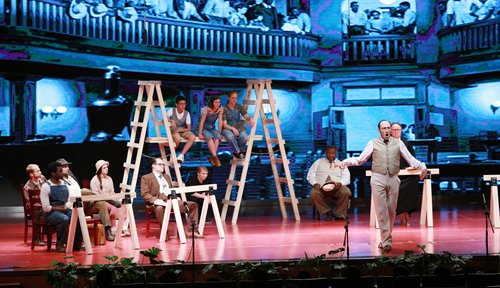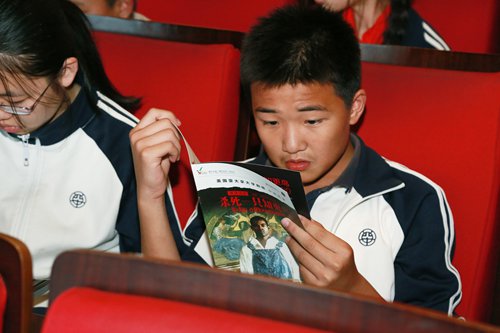
A scene from To Kill a Mockingbird Photo: Courtesy of Mu Wen

A student from Beijing No.4 High School reads the program for To Kill a Mockingbird on Tuesday. Photo: Courtesy of Mu Wen
"That poor black man!" murmured 14-year-old Li Chengguo (pseudonym) as he sat in front of the stage watching a scene from the adaptation of the Western classic To Kill a Mockingbird in which Tom Robinson is convicted despite his attorney making an excellent case for his innocence.
Li and several hundred of his schoolmates watched the English-language drama, staged by the Montana Repertory Theatre from the US and three of Li's schoolmates, on Tuesday at their school - Beijing No.4 High School.
"Although it was too difficult to understand everything from beginning to end, I was still able to understand many lines and the storyline," a 13-year-old girl surnamed Wu told the Global Times after the show. Wu mentioned that notes and character introductions provided by her schoolmate Chen Yuetian, who played the character of Walter Cunningham in the play, helped her and her classmates better understand the drama, which was held as part of the ongoing Meet in Beijing Arts Festival.
Understanding others
A Western classic popular among not only high school students in the US, but also those in China, To Kill a Mockingbird by late writer Harper Lee has a quite large readership in China. Teachers often assign it for after-class reading and it is also often part of the curriculum at many universities.
The story, renowned for its warmth, takes place in the 1930s, more than eighty years ago.
"Kids may not be familiar with the history, but they can learn about that history through this timeless story," Alan Clark, an assistant cultural affairs officer with the US Embassy in Beijing, told the Global Times on Tuesday.
"Children can see how people think and what kind of racial issues were in the past. They can get real sense of both justice and injustice and how important it is to treat everyone as an individual."
Greg Johnson, artistic director of the Montana Repertory Theatre, echoed this sentiment in an e-mail to the Global Times, "The ideas and themes of To Kill a Mockingbird are universal and hence our Chinese audiences will understand the very human struggles and triumphs of the people in our production."
Education through experience
The cooperation between the Montana Repertory Theatre and Beijing No.4 High School came after Wang Xiuqin, vice director of the China Arts and Entertainment Group, watched the school's drama society perform the musical Les Miserables two years ago.
"I imagined I'd see an amateur high school club put on such a good a musical. I've seen the Broadway version in New York, so I could tell that they really performed well and that they must have spent a great deal of time on the production," Wang told the Global Times.
Impressed, he decided to help them reach a bigger stage.
Since 2005, many of the top elementary schools and high schools in first-tier cities in China including Beijing, Shanghai, and Guangzhou, capital of South China's Guangdong Province have started to establish drama clubs to help students better understand literary classics from both China and the West.
Take Beijing No. 4 High School for example. It has established not only a Chinese drama club that has put on stage productions such as Thunderstorm by Cao Yu (1910-96) and Teahouse by Lao She (1899-1966), but also an English drama club, which has performed English-language dramas and musicals including Les Miserables and Phantom of the Opera
"It is a complete different experience to perform a classic than it is to listen to a lecture about it. Having students become those characters in the story and experience how they suffered is a great way to educate them," Liu Changming, Beijing No.4 High School's principal, said at a seminar after the performance on Tuesday.
With this theory in mind, young teachers at the school have done everything they can to help encourage students to take to the stage both at school and elsewhere, including international stages. One teacher at the school, Wang Xiaoning, has taken the school's English drama club to take part in the Edinburgh Fringe and Avignon Festival.
"Staging a drama is not just about letting these children say a few lines on stage or dancing and singing. Instead, we hope they can experience the life of each character, which is also a process by which they can learn about themselves and others," said Yang Cheng, a director from the China National Theatre for Children.
"You may not meet anyone like the characters in a story your whole life, but you should know what they experienced and why they made the decisions they did. The meaning of life doesn't lie in how much you know, but how much you experience," echoed Yu Hongyan, a teacher at Beijing No. 4 High School.

